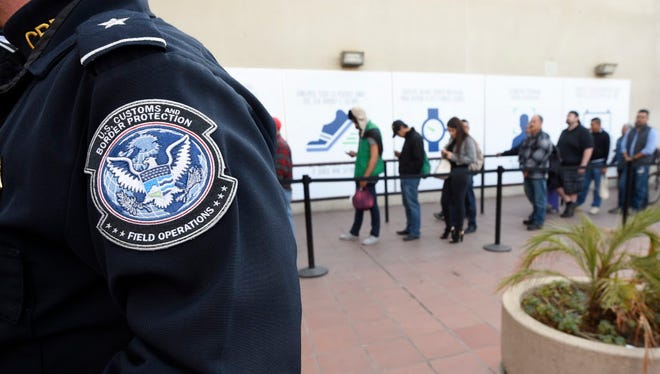Inspector general: Customs and Border Protection wasted $5M on lie-detector tests

WASHINGTON — The federal government wasted $5 million on lie-detector tests for applicants who already admitted criminal or drug history that disqualified them from a job, a watchdog report released Friday found.
Customs and Border Protection didn't prevent applicants from undergoing the tests even after they acknowledged illegal drug use, drug smuggling or a close personal relationship with people who committed those crimes, according to the 17-page report from the inspector general for the Department of Homeland Security.
The report estimated the agency conducted polygraphs at a cost of $5.1 million on 2,300 applicants who should have been disqualified between 2013 and 2016. The unnecessary tests were part of $72.3 million spent for tests on 32,847 applicants during that period, the report said.
Inspector General John Roth called the finding a “waste of scarce polygraph resources.”
The report could underscore the potential difficulty of meeting President Trump's goal of hiring 5,000 more Customs and Border Protection officers and 10,000 Immigration and Customs Enforcement officers.
Customs and Border Protection said in a statement responding to the report that it recently changed its application process to better review candidates before a polygraph is administered.
But the agency also said it considers the applicant's entire background in deciding whom to hire, and that the polygraph test might lead to a faster decision than several weeks granted to applicants to respond to negative information provided during the interview process.
"While removing candidates from the process prior to the delivery of the polygraph may appear to save money, it could add time to the hiring process since removing an applicant for a failed polygraph exam is, many times, done more quickly," the agency said in a statement Friday.
However, the report found that Customs and Border Protection didn't have a step in the application process to remove candidates who could not have been hired regardless of their polygraph results.
Sean Mildrew, an accountability official with Customs and Border Protection, said the agency weighs mitigating factors when deciding whom to hire, including the seriousness and frequency of the conduct and the age and maturity of the applicant.
While some applicants should not have progressed to the polygraph stage, Mildrew said many of the cases the inspector general studied lacked the information to determine whether the person could be hired.
The agency also disputed the $5.1 million estimate for 2,300 disqualified applicants, which the inspector general based on a projection from 380 polygraph exams with 71 disqualifying admissions.
Beginning in March 2015, Customs and Border Protection allowed polygraph examiners to consult with an adjudicator if an applicant made an admission before or during a test. But supervisors were still approving polygraphs, and 28 of the 71 disqualifications who were polygraphed occurred after March 2015, according to the inspector-general's report.
The agency said that as of June 12, examiners are supposed to call an adjudicator any time an applicant provides potentially disqualifying information. The decisions can be made in less than 10 minutes.
But without a polygraph, the agency said applicants must be given due process to respond to negative information, which in some cases can take weeks.
"Applicants removed from the hiring process due to a negative suitability determination are first allowed due process for any information not developed directly, first-hand, from the applicant," Customs and Border Protection said. "CBP must be sure to balance the need to remove candidates in the most fiscally responsible and timely manner; this balance is key to the efficiency of the overall hiring process.”